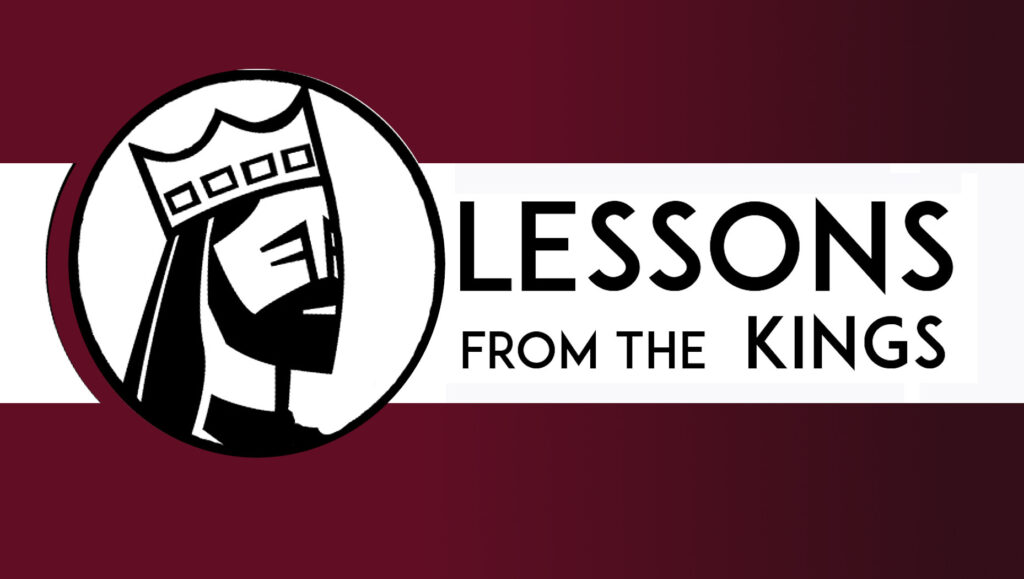Recorded live February 11, 2021.
Our Adult Discipleship group (Midweek Bible class) is going through the Kings of Israel and Judah. You are welcome to join us for any session in person or online. See the calendar for dates. [View Series & Handouts]
This chart is a map of our course of study. We will go chronologically king by king.
King Amon
Amon followed the evil of his father, but not the conversion of his father. His reign was a short two years. His servants assassinated him in a conspiracy to take over the throne. But the people in turn killed his assassins and made his son, Josiah, the new king.
Perhaps Manasseh’s conversion came too late for him to influence his twenty-two year-old son, Amon. “He did what was evil in the eyes of the LORD, just as his father Manasseh had done. Amon sacrificed to all the images that Manasseh his father had made, and he served them. But he did not humble himself before the LORD, as Manasseh his father had humbled himself. Instead, Amon even multiplied the guilt.” (2 Ch 33:22–23)
Why is the home sometimes the hardest place to initiate spiritual reform? Why should it be the first place we work to reform?
Amon’s brief account can be read in: 2 Kings 21:19-26; 2 Chronicles 33:21-24
King Josiah
Josiah came to the throne at the young age of eight after the people killed his father’s assassins. Josiah would have been around 5-6 years old when his grandfather, Manasseh was enacting his reform efforts after so much evil. The seed of faith planted in his youth grew stronger throughout his life.
His conscience was stricken when he learned the Scriptures, leading him to enact many reforms. But he would end up being the final godly king of Judah.
After his death, the people abandoned his reform efforts and reverted back to evil. His own sons wouldn’t live into old age but would be swept away as the kingdom of Judah came to an end.
Josiah met an early death when he tried to stop the Egyptians from marching across his land to fight in an alliance with Assyria against the Babylonians, Medes, and Persians. The Egyptians killed king Josiah. However, they ended up losing the battle at Carchemish in 605 B.C. This marked the end of Egypt’s’ intervention in foreign affairs and the sudden rise of power of Babylonia. God would use Babylon’s control to bring an end to Judea.
Read about Josiah: 2 Kings 22:1 – 23:30; 2 Chronicles 34:1 – 35:27
The Greatest Discovery
In 1947 A Bedouin shepherd discovered a cave near Khirbet Qumran on the northwest shore of the Dead Sea. In it he found ancient scrolls which he ended up selling for $28. Many other scrolls were found in eleven caves around the region. It turned out they were manuscripts of the Hebrew Bible dating to before the time of Christ. Their discovery was a priceless find containing nearly all of the oldest copies of the Bible ever found. Josiah’s efforts to clean and restore the temple led to the discovery of “The Book of the Law” given through Moses. Whether it was a copy overlooked during Manasseh’s wicked purge or an even older original it was a priceless find. Read 2 Chronicles 34 regarding this discovery.
What events led to the Bible being lost and found in ancient Israel? How could this same loss or discovery happen in someone’s household today?
Identify some of the good response of Josiah after the Book of the Law had been discovered. How can a spiritually sliding home emulate this type of a response to the Word of the Lord?
Explain: “There is more than one way to lose a Bible.”
What aspect of God’s grace is evident in this chapter?
The Greatest Spiritual Revival Effort
What steps have you taken when you have been sick? Describe some of the measures that hospital staff will take to help a severely ill person become healthy again. Josiah’s efforts to return the spiritually lost people of Judah back to the Lord are comprehensive. Read 2 Kings 23:1-27
Josiah’s act of defiling these centers of false worship was to render them unfit for any future rituals by those who followed the wicked practices. Describe all the things which Josiah did to reform the worship in Judah.
Why do you suppose some of these artifacts of idolatry were able to stand for so long?
Exercise: Make a list of influences in your life which threaten to become something you fear, love, or trust more than the Lord. Identify which ones are obstacles to your worship of the Lord with all your heart, soul, and mind. Evaluate the dangers. Teach your family about the dangers. And remove anything that threatens your household’s faith.
Apart from tearing down idolatry, what else must be included in a healthy spiritual revival?

